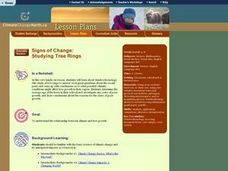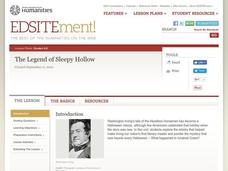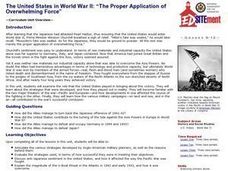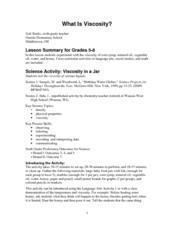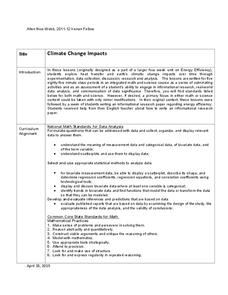Curated OER
Using MY NASA DATA to Determine Volcanic Activity
Learners explore how aerosols are used in science to indicate volcanic activity and how biomass burning affects global aerosol activity. Students access data and import into MS Excel using graphical data to make inferences and draw...
Curated OER
Statistics Canada
Young scholars practice using graphing tools to make tables, bar charts, scatter graphs, and histograms, using census data. They apply the concept of measures of central tendency, examine the effects of outliers. They also write...
Curated OER
Not Just the Facts
Encourage your learners to explore the differences between hard news and news analysis. They outline a complex news analysis about the upcoming presidential election, then endeavor to write an analysis of the same topic, using local...
Curated OER
Signs of Change: Tree Rings
Students identify and experiment with dendrochronology (the study of tree rings to answer ecological questions about the recent past) and come up with conclusions as to what possible climatic conditions might affect tree growth in their...
Curated OER
The Legend of Sleepy Hollow
Explore Washington Irving's "The Legend of Sleepy Hollow" in this literature analysis lesson. Middle schoolers read and summarize the plot of the story. They then adapt passages for a contemporary audience and analyze the...
Curated OER
The Fabled Maine Winter
Young scholars graph and analyze scientific data. In this research instructional activity students use the Internet to obtain data then draw conclusions about what they found.
Curated OER
English Lesson Plans for Grade 7
Discuss the correct use of certain phrases such as "managed" and "could" in this English lesson. Middle schoolers listen to interviews on work customs in different countries and compare them. They make inferences after reading given...
Prestwick House
Teaching Shakespeare: Sonnet 73
It's that time of year to consider how Shakespeare selects his images and structures his Sonnet 73 to develop the meaning of the poem. Class members examine the rhyme scheme, the indented lines, the conceit, and the images used in each...
Curated OER
"The Proper Application of Overwhelming Force": The United States in World War II
Students examine the role that the U.S. played in bringing about victory in the two major theaters of the war in the Pacific and Europe. How the various military campaigns contributed to the war's successful conclusion forms the focus of...
Curated OER
Analyzing Two or More Nonfiction Texts
How does recognizing the author's purpose help you draw conclusions about a topic? Using two articles (both are attached), learners brainstorm why each author wrote each article. Are their purposes similar or different? Learners use a...
American Statistical Association
Step into Statastics
Class members study the size of classmates' feet and perform a statistical analysis of their data. They solve for central tendencies, quartiles, and spread for the entire group as well as subgroups. They then write a conclusion based on...
Statistics Education Web
How High Can You Jump?
How high can your pupils jump? Learners design an experiment to answer this question. After collecting the data, they create box plots and scatter plots to analyze the data. To finish the lesson, they use the data to draw conclusions.
Curated OER
What Is Viscosity?
Students experiment with the visocosity of corn syrup, mineral oil, vegetable oil, water, and honey. They research viscosity before beginning. Pupils draw the conclusion that the marble sinks more slowly in the liquids with greater...
Curated OER
Sequence, Predict, Infer: Pink and Say
Practice sequencing with your 2nd graders via Patricia Polacco's Civil War book Pink and Say. Begin with a blindfold and a bag of mystery items. Connect their use of clues to identify what they can't see with the skill of making...
American Statistical Association
Don't Spill the Beans!
Become a bean counter. Pupils use a fun activity to design and execute an experiment to determine whether they can grab more beans with their dominant hand or non-dominant hand. They use the class data to create scatter plots and then...
Kenan Fellows
Using Water Chemistry as an Indicator of Stream Health
Will this water source support life? Small groups test the chemistry of the water drawn from two different sources. They then compare the collected data to acceptable levels to draw conclusions about the health of the source. The...
Statistics Education Web
Consuming Cola
Caffeine affects your heart rate — or does it? Learners study experimental design while conducting their own experiment. They collect heart rate data after drinking a caffeinated beverage, create a box plot, and draw conclusions....
Kenan Fellows
Effects of a Golf Course on Stream Health
Is the golf course causing issues in the stream? Find out with a resource that has groups perform chemical water tests to analyze the effects of a golf course on a stream. Pupils collect water above and below the course and analyze the...
University of Colorado
The Moons of Jupiter
Can you name the three planets with rings in our solar system? Everyone knows Saturn, many know Uranus, but most people are surprised to learn that Jupiter also has a ring. The third in a series of six teaches pupils what is around...
University of Texas
Matter and the Periodic Table Chemical Families and Periodic Trends
Is assembling the periodic table as simple as Tetris? Scholars arrange colored cards into a logical order and then make connections to the arrangement of the periodic table. Hands-on activities include adding trend arrows and analyzing...
Kenan Fellows
Climate Change Impacts
Turn up the heat! Young mathematicians develop models to represent different climates and collect temperature data. They analyze the data with regression and residual applications. Using that information, they make conclusions about...
Curated OER
Are We Alone
Seventh graders collect/analyze data and draw conclusions; support reasoning by using a variety of evidence; construct logical arguments; access information at remote sites using telecommunications; apply the concept of percent;...
Curated OER
Rockin’ the World: Rock and Roll and Social Protest in 20th Century America
Students explore protest songs. In this interdisciplinary instructional activity, students examine issues-based music by summarizing lyrics and revealing inferences, generalizations, conclusions, and points of view found in the songs.
Curated OER
During Reading Strategies
Students employ strategies to increase comprehension while they are reading. In this language arts lesson, students must infer, predict and visualize in order to improve comprehension.





